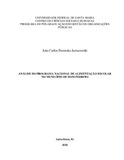| dc.creator | Jarosezwski, João Carlos Prerniska | |
| dc.date.accessioned | 2021-11-03T12:54:44Z | |
| dc.date.available | 2021-11-03T12:54:44Z | |
| dc.date.issued | 2020-08-31 | |
| dc.identifier.uri | http://repositorio.ufsm.br/handle/1/22669 | |
| dc.description.abstract | This work has as main objective to analyze the main difficulties faced in the city of Dom Pedrito for the execution of the National School Feeding Program (PNAE), both from the point of view of public managers and from the perspective of local family farmers. This program, instituted by Law no. 11,947, of 2009, stipulates that, at least, 30% of the PNAE's resources are destined for the purchase of products from local family farming. In methodological terms, the study can be classified as qualitative in terms of its approach, applied in terms of its nature and exploratory and descriptive in terms of its objectives. Considering these definitions, the collection was carried out in a bibliographic and documentary way to obtain secondary data. For the collection of primary data, semi-structured interviews were applied to public agents and family farmers. As for the results, it was observed that some obstacles are known by both categories, such as the difficulty of access that producers have to deliver their goods in the urban area, from the necessary distances to travel to the conditions of the rural roads in the municipality. The split in delivery and the need for other forms of subsidy for rural producers also proved to be difficult for the good performance of the PNAE, as well as the lack of documentation on the part of some farmers. Other difficulties are related to the insufficient production of food needed by municipal schools and climatic conditions, when taking into account the rains, droughts and bad weather. From the point of view of city hall managers and also from EMATER, forms of financing for farmers are necessary, either through the strengthening of existing policies, or through new forms of public financing, in addition to the need for improvements in infrastructure and food delivery logistics in municipal schools. From this, it was found the absence of joint planning for production adapted to the needs of municipal schools and rural producers. For this, it is necessary to map production and align with the needs of municipal schools. | eng |
| dc.language | por | por |
| dc.publisher | Universidade Federal de Santa Maria | por |
| dc.rights | Attribution-NonCommercial-NoDerivatives 4.0 International | * |
| dc.rights.uri | http://creativecommons.org/licenses/by-nc-nd/4.0/ | * |
| dc.subject | PNAE | por |
| dc.subject | Agricultura familiar | por |
| dc.subject | Dom Pedrito | por |
| dc.subject | Family farmers | eng |
| dc.title | Análise do Programa Nacional de Alimentação Escolar no município de Dom Pedrito | por |
| dc.title.alternative | Analysis of the National Program for School Food in the municipality of Dom Pedrito | eng |
| dc.type | Dissertação | por |
| dc.description.resumo | Este trabalho tem como objetivo principal analisar as principais dificuldades enfrentadas no município de Dom Pedrito para a execução do Programa Nacional de Alimentação Escolar (PNAE), tanto do ponto de vista dos gestores públicos quanto da perspectiva dos agricultores familiares locais. Esse programa, instituído por meio da Lei n. 11.947, de 2009, estipula que, no mínimo, 30% dos recursos do PNAE sejam destinados para a compra de produtos oriundos da agricultura familiar local. Em termos metodológicos, o estudo pode ser classificado como qualitativo quanto à sua abordagem, aplicado quanto à sua natureza e exploratório e descritivo quanto aos seus objetivos. Considerando essas definições, a coleta foi realizada de forma bibliográfica e documental para a obtenção dos dados secundários. Para a coleta de dados primários foram aplicadas entrevistas semiestruturadas aos agentes públicos e aos agricultores familiares. Quanto aos resultados, observou-se que alguns empecilhos são conhecidos por ambas as categorias, como a dificuldade de acesso que os produtores possuem para entregar suas mercadorias na área urbana, desde as distâncias necessárias a percorrer até as condições das estradas rurais do município. O fracionamento na entrega e a necessidade de haver outras formas de subsídio aos produtores rurais também se mostraram dificultosos para o bom desempenho do PNAE, como também a falta de documentação por parte de alguns agricultores. Outras dificuldades estão relacionadas a produção insuficiente dos alimentos necessários às escolas municipais e as condições climáticas, quando levado em consideração as chuvas, secas e intempéries. Do ponto de vista dos gestores da Prefeitura Municipal e também da EMATER, se fazem necessárias formas de financiamento aos agricultores, seja por meio de fortalecimento de políticas já existentes, seja por novas formas de financiamento público, além da necessidade de melhorias na infraestrutura e na logística de entrega dos alimentos nas escolas municipais. A partir disso, constatou-se a ausência de um planejamento conjunto para a produção adaptada às necessidades das escolas municipais e os produtores rurais. Para isso, se torna necessário mapear a produção e alinhar às necessidades das escolas municipais. | por |
| dc.contributor.advisor1 | Bender Filho, Reisoli | |
| dc.contributor.advisor1Lattes | http://lattes.cnpq.br/9794436610539367 | por |
| dc.contributor.referee1 | Mainardi, Caroline Ferreira | |
| dc.contributor.referee2 | Coronel, Daniel Arruda | |
| dc.creator.Lattes | http://lattes.cnpq.br/7573594169782193 | por |
| dc.publisher.country | Brasil | por |
| dc.publisher.department | Administração Pública | por |
| dc.publisher.initials | UFSM | por |
| dc.publisher.program | Programa de Pós-Graduação em Gestão de Organizações Públicas | por |
| dc.subject.cnpq | CNPQ::CIENCIAS SOCIAIS APLICADAS::ADMINISTRACAO::ADMINISTRACAO PUBLICA | por |
| dc.publisher.unidade | Centro de Ciências Sociais e Humanas | por |



